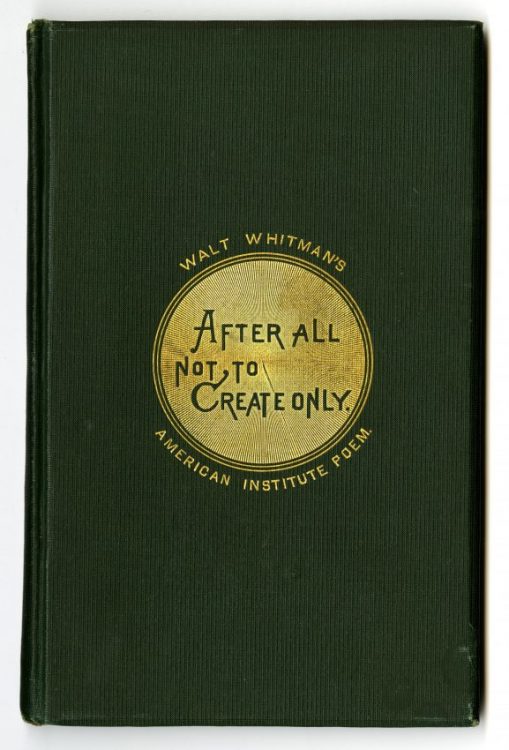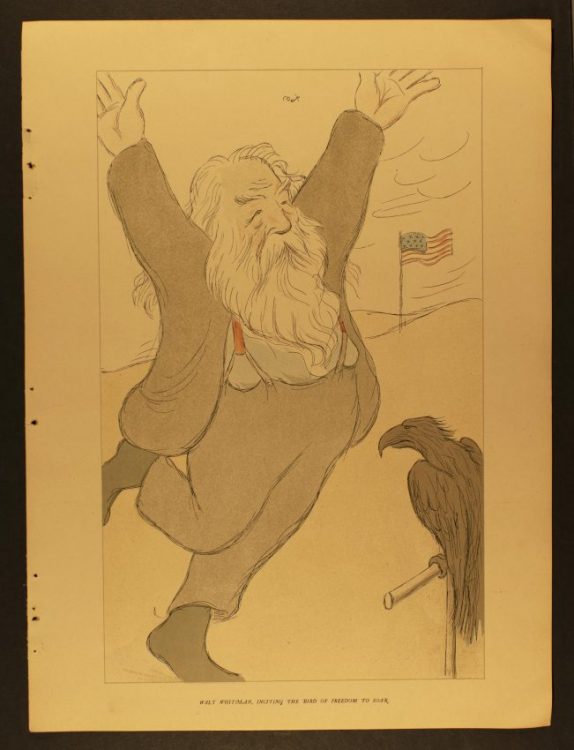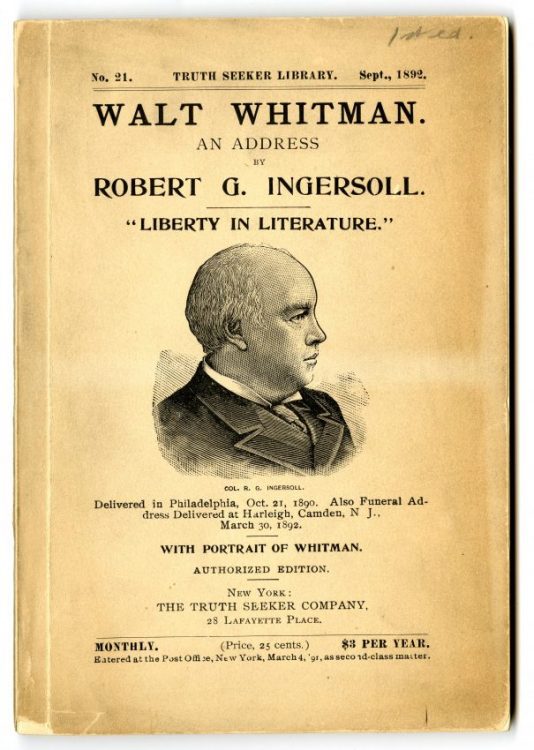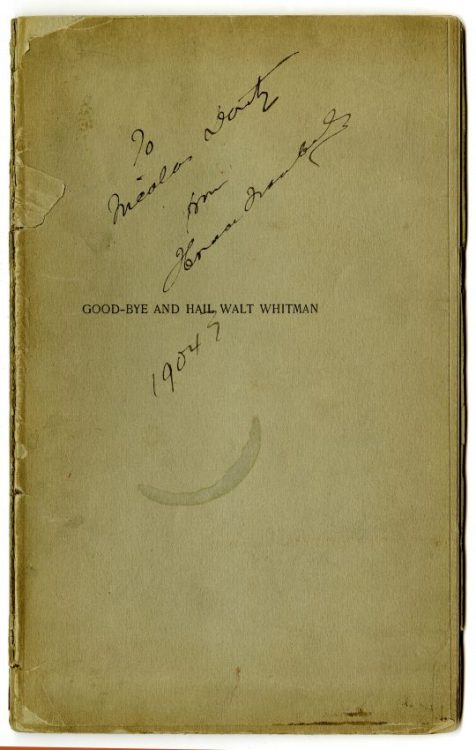Whitman, Walt. I Sit and Look Out. Marshall, Minn.: Ox Head Press, 1984.
This fine press miniature includes a linoleum cut frontispiece by the artist and letterpress printer Don Olsen.
Whitman, Walt. Notebook Used Along the New Jersey Coast, September & October 1883. Montclair, New Jersey: Caliban Press, 1992.
Printed in an edition of 125 copies, Notebook publishes for the first time the diary Whitman kept during his 1863 visit to Ocean Grove, New Jersey recording events, impressions and phrases that he later used in several poems. Designed, printed and bound by Mark McMurray at the Caliban Press.
Poems for Democracy. Octon [France]: Verdigris, 2017.
Whitman, Walt, Poems for Democracy. Octon [France]: Verdigris, 2017.
From the colophon: "These poems by Walt Whitman are chosen as a message to the 45th President of the U.S.A. The accompanying mezzotints by Judith Rothchild of sleepy America are printed by the artist on Hahnemühle paper. The book, a leporello [concertina fold-out book], is published in an edition of thirty signed by the by the artist and typographer.”
Song of the Open Road. New York: Limited Editions Club, 1990
Whitman, Walt. Song of the Open Road. New York: Limited Editions Club, 1990
This fine press publication of one of Whitman's best-known poems was printed in an edition of 550 copies with photogravures by Aaron Siskind.
Whitman, Walt. Two Rivulets: Including Democratic Vistas, Centennial Songs, and Passage to India. Camden: [Walt Whitman], 1876.
The Author's edition of Two Rivulets is the companion volume to the 1876 Author's edition of Leaves of Grass. Two Rivulets incorporates the prose works Democratic Vistas (1871) and Memoranda During the War (1875), the poetry pamphlets As a Strong Bird on Pinions Free (1872) and Passage to India (1871), a group of “Centennial Songs,” and other fugitive writings. This copy is from the library of William M. Rossetti and bears his signature dated 1876 on the front free endpaper.
Whitman, Walt. After All, Not to Create Only: Recited by Walt Whitman on Invitation of Managers, American Institute, on Opening Their 40th Annual Exhibition, New York, Noon, September 7, 1871. Boston: Roberts Bros, 1871.
Whitman was invited by this organization which celebrated the American worker “to suggest that artists and poets in the United States may best give up the old-time and old-world themes and betake themselves to convey the power, beauty and nutriment of Humanity here, with current Inventions, Science, Patriotism—and to make Labor ideal as well as material.”
Beerbohm, Max, “Walt Whitman Inciting the Bird of Freedom to Soar,” in The Poet's Corner. London: Penguin Books Ltd, 1943.
The British artist and author Max Beerbohm originally published this caricature of Whitman in 1904.
Local and National Poets of America: with Interesting Biographical Sketches and Choice Selections from Over One Thousand Living American Poets, ed. Thomas W. Herringshaw. Chicago: American Publishers' Association, 1890.
This massive anthology includes a selection of Whitman’s shorter poems.
Camden's Compliment to Walt Whitman, May 31, 1889: Notes, Addresses, Letters, Telegrams, edited by Horace Traubel. Philadelphia: David McKay, 1889.
This volume collects the tributes to Whitman that poured in after his death from all over the world in the form of telegrams, letters, and published articles.
Ingersoll, Robert Green, 1833-1899. Walt Whitman. New York: Truth seeker Co, 1890.
This volume prints Whitman’s funeral eulogy which was delivered by his friend, the American author and orator Robert Ingersoll.
At the Graveside of Walt Whitman: Harleigh, Camden, New Jersey, March 30, 1892 and, Sprigs of Lilac, ed. Traubel, Horace. Philadelphia: Billstein & Son, 1892.
This pamphlet prints a collection of speeches and tributes read at Whitman's funeral by his friends. This copy bears Horace Traubel’s presentation inscription on the front cover.

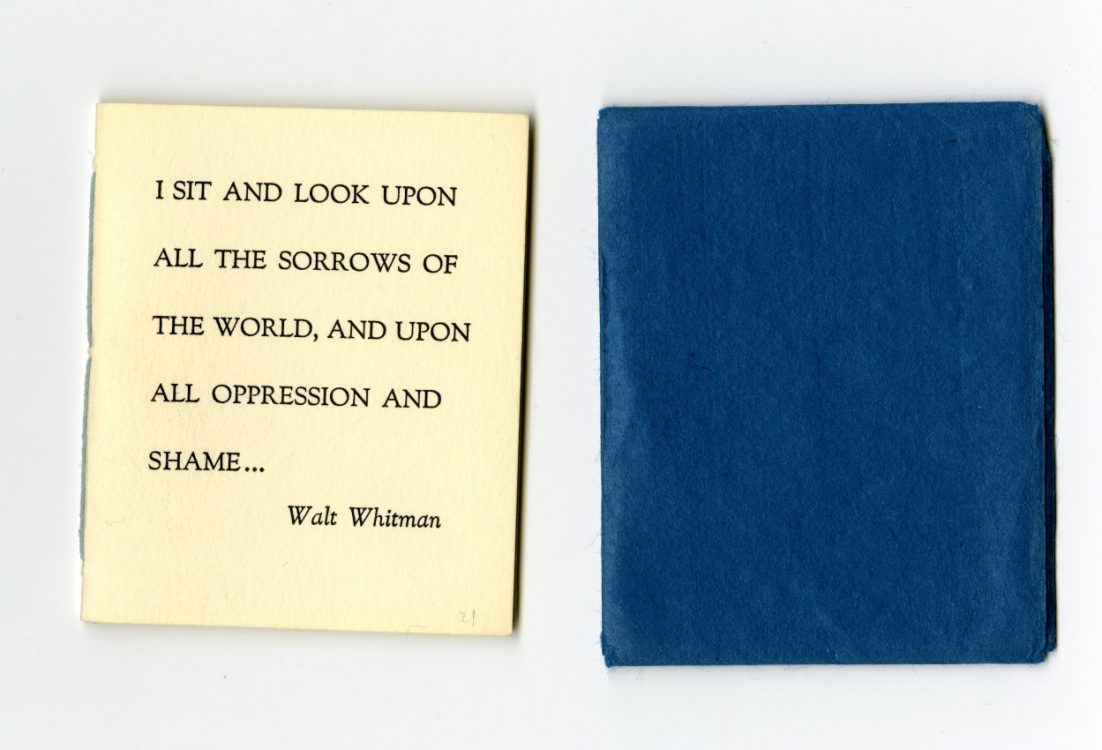
![Two Rivulets Cover: Including Democratic Vistas, Centennial Songs, and Passage to India. Camden: [Walt Whitman], 1876. Two Rivulets Cover: Including Democratic Vistas, Centennial Songs, and Passage to India. Camden: [Walt Whitman], 1876.](https://exhibitions.lib.udel.edu/whitman/wp-content/uploads/sites/39/2019/10/Two-Rivulets-Cover-Including-Democratic-Vistas-Centennial-Songs-and-Passage-to-India.-Camden-Walt-Whitman-1876_1-e1579105937929.jpg)
